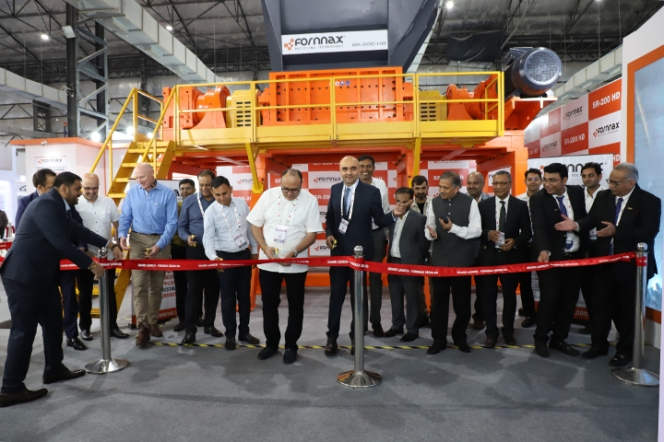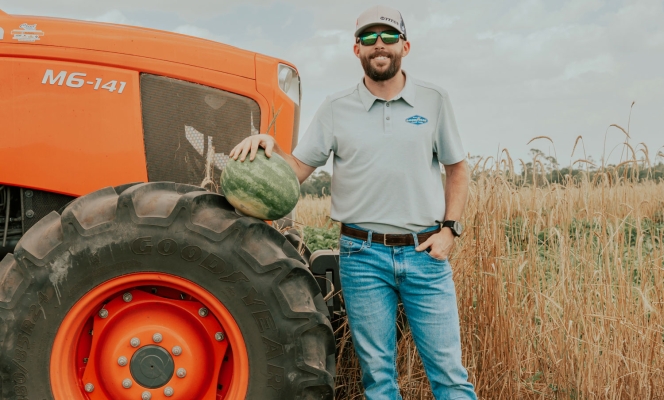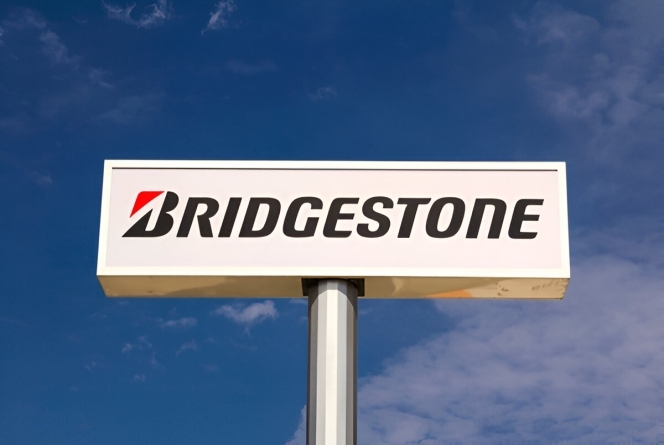Fornnax Unveils High-Capacity SR-200 HD Primary Shredder at India Rubber Expo
- By TT News
- March 29, 2024

Fornnax, a global leader in recycling machinery, debuted its innovative SR-200 HD Dual-Shaft Primary Shredder at the prestigious India Rubber Expo in Mumbai. The launch marks a significant advancement in recycling technology and showcases Fornnax's commitment to engineering excellence and sustainability.
Industry Leaders Witness Unveiling
The SR-200 HD's unveiling was a major milestone, with prominent figures like Ajay Shah, President of Reliance Industries, and Vishnu Bhimrajka, chairman and chief convenor of the India Rubber Expo 2024, in attendance. Additionally, a consortium of key Fornnax clients, including representatives from Rathi Rubber, Tyre Collection Australia, Vinora Industries, Valencia Rubber Tech, Unity EcoGreen, Earthman Rubber, Oyster Industries, and Earthmet Resources, participated in the ceremony, highlighting industry collaboration.
Responding to Market Demand
Driven by rising customer demand for high-capacity pre-shredders, Fornnax developed the SR-200 HD, an enhanced model of the existing SR series. This new model boasts increased power and the highest input capacity within the SR range.
Applications beyond tyres
While the SR-200 HD excels at tyre shredding, its versatility extends to various applications, including high-volume municipal solid waste, wood pallets, and industrial and commercial waste processing.
Addressing global recycling needs
The introduction of the SR-200 HD aligns with the growing global demand for efficient pre-shredders due to stricter waste treatment regulations. This solution presents significant opportunities for industries in the Middle East, Australia (facing full-tyre export bans), and Europe, where advanced recycling solutions are increasingly sought.
Targeting Large-Scale Operations
The SR-200 HD is designed for large-scale recyclers and cement plants requiring high-capacity machinery. Fornnax has already secured pre-launch orders from India, Australia, the Middle East, and Europe, reflecting the company's established global reputation.
Focus on R&D and customer needs.
Fornnax prioritises developing innovative solutions tailored to specific input types rather than offering one-size-fits-all models. The company is steadily increasing its R&D budget to focus on customer-specific solutions and continuously improving existing models based on user feedback. This commitment extends beyond tyre applications. Fornnax actively develops solutions for various recycling needs to achieve a broader customer base and solidify its leading global shredder manufacturer position.
Advanced Features and Options
The SR-200 HD has various proven Fornnax-developed knives to cater to diverse customer requirements. The robust cutting chamber design and slow-speed shafts generating up to 2,00,000 Nm of torque enable the SR-200 HD to handle the most challenging materials. A quick shaft change system also facilitates an efficient transition between different applications.
Meeting Diverse Output Needs
The SR-200 HD offers a variety of output configurations to meet specific downstream equipment requirements. The SR-200 with disc classifier provides 60–150 mm output sizes. The SR-200 HD with a Trommel screen caters to the cement industry by producing 60–80 mm of TDF alternative fuel. Finally, the SR-200 HD without a screen offers single-pass rough shreds up to 400 mm.
The SR-200 HD's 750-mm-diameter knives and larger shaft centre provide increased discharge space for processing bulky and high-thickness materials like agricultural, truck, and OTR tyres.
Commercial benefits: • The new HD model provides a low cost per tonne, high reliability, ease of operation, and more. Flexibility for various types of tyres and a design optimised especially for sites with a 25-tonne per-hour production requirement. • The SR-200 HD model provides higher capacity due to its high RPM and torque, reducing workforce, electricity, and wear costs. • The new HD model is designed to focus on the TDF application (tyre-derived fuel). Cement plants usually utilise 3 to 4 lines to maximise production. The SR 200 HD is a single-line system that delivers a high output equivalent to 3–4 smaller lines.
|
Titan International Announces Official Partnership With NASCAR Driver Ross Chastain
- By TT News
- December 19, 2025

Titan International Inc. is embarking on an official partnership with NASCAR competitor Ross Chastain, who is also an eighth-generation watermelon farmer. This alliance extends far beyond traditional sponsorship, focusing instead on direct agricultural support. Titan is integrating its expertise into the daily operations of the Chastain family farm, where company specialists are collaborating alongside Melon 1 to address the distinct challenges of watermelon cultivation.
The farm’s diverse fleet, which includes everything from primary tractors to specialised sprayers and utility vehicles, requires a wide array of tyre specifications. Titan is supplying a comprehensive portfolio of products and tailored support for this entire equipment lineup, aiming to enhance operational efficiency and minimise potential downtime.
Chastain’s national profile uniquely bridges the worlds of high-speed racing and foundational farming. Leveraging his platform as NASCAR’s prominent ‘agriculture guy’, this partnership is designed to generate meaningful awareness for the broader farming community. The initiative underscores a shared mission to recognise the critical innovations and relentless effort of agricultural professionals who support global supply chains. Ultimately, it represents a functional fusion of motorsport visibility and tangible, on-farm problem-solving.
Chastain said, “I grew up farming watermelons with my family, and that will always be a part of who I am. What excites me about working with Titan is that they’re actually on the farm, looking at our equipment and helping us find real solutions. I trust Goodyear tyres on the track, and now I trust Titan and Goodyear Farm Tires on our farm. That’s what 'Ag to Asphalt' means to me.”
Scott Sloan, Global Ag/LSW Product Manager, Titan, said, “Watermelon farming has unique demands across a wide range of equipment. Our goal is to make each machine perform at its best. If Ross trusts Titan on his farm, that tells other farmers they can trust us too.”
Kim Boccardi, VP – Marketing, Titan, said, “For Titan, this partnership represents exactly what we stand for. We’re here to listen, to learn and to provide the service, support and expertise farmers want and need. Ross and his family welcomed us onto their farm, and together we’re showing the industry that if a machine needs tyres, whether it's tractors, trailers, ATVs or UTVs, we’ve got it handled.”
Radar Tyres Appoints Cricket Icon Michael Clarke As Global Brand Ambassador
- By TT News
- December 19, 2025
Radar Tyres has entered a strategic global partnership with celebrated Australian cricketer Michael Clarke, appointing him as the company's new brand ambassador. This alliance represents a significant step in the brand's ongoing development, aimed at bolstering support for its international network of distributors and retailers. Clarke’s worldwide recognition and respected legacy are intended to elevate Radar’s visibility and deepen its connection with consumers across key markets.
The brand emphasises that Clarke's professional attributes – encompassing peak performance, resilience and leadership – perfectly mirror its own core mission of delivering high-quality, premium performance tyres to everyday drivers globally. His celebrated career, which includes captaining Australia to a 2015 Cricket World Cup victory and achieving an iconic Test score of 329 not out, has cemented his status as a sporting legend. Beyond the field, his influence extends through media engagements, business ventures, and a substantial digital footprint, allowing him to connect authentically with diverse, worldwide audiences.
This collaboration is a cornerstone of Radar Tyres' long-term strategy to invest in meaningful brand elevation. By partnering with influential figures like Clarke, the company seeks to authentically amplify its message and mission. The initiative will be supported by a comprehensive series of online and on-ground activities, all designed to actively engage consumers and drive the brand’s presence into households worldwide, thereby providing substantive support to its retail partners.
Clarke said, “I’m thrilled to join the Radar Tyres family. Radar Tyres is a dynamic, fast-growing brand whose mission to make high-quality, high-performance tyres accessible to everyday drivers around the world, truly resonates with me. They deliver premium products at an affordable price, and I’m excited to be part of their journey in bringing this mission to even more drivers globally.”
G S Sareen, President and CEO, Omni United, said, “We are thrilled to welcome Michael Clarke to the Radar family. Michael is a household name whose passion, accomplishments and global appeal make him an ideal ambassador to elevate our brand. His association will help us connect more meaningfully with everyday drivers who seek reliable, premium performance but at an accessible price. This partnership will expand our reach, strengthen our presence in key markets and further reinforce Radar Tyres as a trusted and fast-growing global brand.”
Bridgestone Recalls Select Firestone Tyres Over Potential Belt Separation Risk
- By TT News
- December 19, 2025

Bridgestone Americas is voluntarily recalling 1,742 Firestone Destination LE3 all-season tyres produced for the US market. The affected tyres, size 265/70R17, were manufactured at the company's Wilson, North Carolina, facility between 26 October 2025 and 8 November 2025. An internal review identified a production error that could lead to an increased risk of belt separation over the tyre's life, reducing its expected durability. As a result, these tyres may not meet the endurance specifications of the relevant U.S. Federal Motor Vehicle Safety Standard. The recall is being undertaken as a precautionary measure, and Bridgestone confirms it is not aware of any related accidents or injuries.
The company is contacting all known customers, distributors and dealers. Owners can bring their vehicles to any authorised Bridgestone or Firestone retail outlet for a complimentary inspection. If a tyre is confirmed to be part of the recall, it will be replaced at no cost with a comparable Bridgestone or Firestone tyre, or another suitable alternative. Bridgestone has formally notified the appropriate US regulatory agency in compliance with legal requirements. The recall pertains exclusively to replacement tyres used on light trucks, crossovers and SUVs.
The details are given below:
- Firestone Destination LE3 tyres in size 265/70R17
- Plant ID: 1W2
- Size Code: 1Y
- Optional Code: LE31
- Beginning Date Code: 4325
- Ending Date Code: 4425
Anyline Surpasses 100 Million Digital Tyre Inspections Globally
- By TT News
- December 19, 2025

Anyline, a prominent provider of AI-driven mobile tyre inspection technology, achieved a significant landmark in 2025 by completing over 100 million digital tyre inspections globally in a single year. This milestone underscores the widespread integration of its software within automotive service environments, where dealerships, tyre retailers and repair shops rely on its precise and rapid performance under real workshop conditions.
The practical benefits of this technology are substantial for service technicians. It enhances operational consistency on the shop floor, leading to greater overall efficiency and increased customer satisfaction while also creating avenues for additional revenue. Its proven effectiveness at an enterprise level is demonstrated through its adoption by major aftermarket players like Discount Tire and partners such as Tire Storage Solutions.
On a practical level, digital tyre inspection standardises procedures and record-keeping in the service bay. This contributes directly to safety by facilitating the early detection of worn treads and potential hazards. It also improves regulatory compliance through the consistent digital capture of tyre details, including identification numbers. Furthermore, the technology provides valuable performance insights by tracking wear patterns over time, builds customer trust with clear visual documentation and drastically cuts down on manual labour. Cumulatively, these millions of inspections represent immense time savings, helping businesses address ongoing workforce challenges and operational demands.
To further broaden its reach, Anyline has expanded its offerings beyond the ready-made TireBuddy App that it released earlier this year. The company now provides the TireBuddy ToolKit, a highly customisable software development kit. This toolkit allows enterprise and platform partners to embed sophisticated tyre inspection functionalities – including tread depth measurement, tyre identification and condition assessment – directly into their own existing mobile applications on both iOS and Android. Designed for seamless integration and real-world use, it features intuitive guidance to help technicians achieve reliable, uniform results across various locations.
Lukas Kinigadner, Co-CEO, Anyline, said, “Surpassing 100 million tyre inspections in a single year is a defining moment for Anyline and the industry. Tyre inspection isn’t a nice to have; it’s a safety-critical process that depends on consistency and accuracy at scale. We’re on a mission to transform that process with fast, accurate and dependable digital assessments that make technicians’ work easier and keep the customer experience at the centre. This milestone is a strong signal that we’re on the right track.”
Simon Brooks, Vice President – Product, Anyline, said, “With our TireBuddy ToolKit, our goal is to make advanced tyre inspection as easy as adding an SDK into an existing app. We’re excited to see how our customers customise it for their workflows, and we look forward to TireBuddy powering even more safe, consistent tyre inspections in 2026.”







Comments (0)
ADD COMMENT